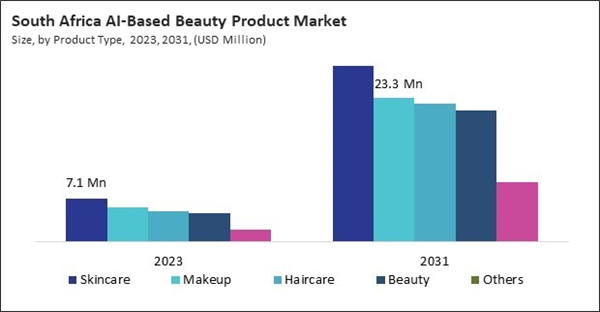The Brazil market dominated the LAMEA AI-Based Beauty Product Market by Country in 2023, and is forecast to continue being a dominant market till 2031; thereby, achieving a market value of $232.6 million by 2031. The Argentina market is capturing a CAGR of 20.8% during (2024 - 2031). Additionally, The UAE market would register a CAGR of 18.7% during (2024 - 2031).
In a competitive beauty industry, consumers are more informed and discerning than ever before. They demand products that are not only effective but also innovative. AI-based beauty products fulfill this demand by leveraging cutting-edge technologies to deliver measurable results. Whether through AI-powered diagnostics for skincare issues or virtual try-on makeup tools, these innovations give consumers confidence in their purchasing decisions and satisfaction with product performance.
In addition, the proliferation of digital platforms and e-commerce channels has accelerated the adoption of AI in beauty products. Brands are integrating AI-powered features into their online platforms to enhance the shopping experience. Virtual try-ons, AI chatbots for customer support, and personalized product recommendations are becoming standard offerings that engage consumers and drive sales. The convenience of accessing AI-driven beauty solutions online has further fueled their adoption among tech-savvy consumers who prefer digital shopping experiences.
E-commerce facilitates direct-to-consumer (DTC) models for beauty brands in Brazil, bypassing traditional retail channels and enabling direct interaction with consumers. AI-powered analytics give brands real-time insights into consumer behavior, purchasing patterns, and market trends. This data-driven approach empowers brands to optimize marketing strategies, personalize promotional campaigns, and tailor product offerings to meet Brazilian consumers’ evolving preferences and expectations. International Trade Administration (ITA), Brazil is one of the most populous nations in Latin America, and its e-commerce sector is anticipated to surpass US$200 billion by 2026, expanding at 14.3% annually. Hence, the rising adoption of AI and the increasing e-commerce sector in the region drive the market's growth.
List of Key Companies Profiled
- L'Oreal S.A.
- The Estee Lauder Companies, Inc.
- Johnson & Johnson
- Coty, Inc.
- Shiseido Company Limited
- Givaudan S.A.
- Chanel S.A.
- FOREO AB
Market Report Segmentation
By Distribution Channel- Online Retail
- Offline Retail
- Subscription Services
- General Consumer
- Premium & Luxury
- Professional
- Others
- Personalized Skincare
- Virtual Makeup Try-On
- Hair Analysis and Styling
- Beauty Enhancement
- Others
- Skincare
- Makeup
- Haircare
- Beauty
- Others
- Brazil
- Argentina
- UAE
- Saudi Arabia
- South Africa
- Nigeria
- Rest of LAMEA
Table of Contents
Companies Mentioned
- L'Oreal S.A.
- The Estee Lauder Companies, Inc.
- Johnson & Johnson
- Coty, Inc.
- Shiseido Company Limited
- Givaudan S.A.
- Chanel S.A.
- FOREO AB









